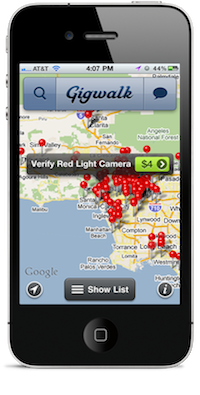
The basic system is pretty straightforward. Companies post jobs that they want done and the amount that they’re willing to pay, then users come in and do the work. Gigwalk uses the location data from users’ iPhones to confirm that they actually did the job, or that they were at least in the right spot. Possible jobs include verifying street names, photographing menus, reporting red-light cameras, and confirming in-store product placements.
[aditude-amp id="flyingcarpet" targeting='{"env":"staging","page_type":"article","post_id":257828,"post_type":"story","post_chan":"none","tags":null,"ai":false,"category":"none","all_categories":"business,entrepreneur,mobile,","session":"A"}']For example, Gigwalk has already worked with navigation company TomTom to check some of the data in TomTom’s maps, and it could tell if the users trying to report information about a specific intersection were actually at or near that spot.
One obvious way to think about this is as a kind of crowdsourcing, but co-founder and chief executive Ariel Seidman said he shies away from that term, because Gigwalk isn’t just randomly assigning tasks to a group of strangers. He said it’s building “a community.” Gigwalkers, as he calls then, will actually recommend and help each other out on various tasks. And over time, users can build trust on the site, earning access to more lucrative jobs. Seidman said a better comparison would be oDesk, where companies can post jobs for and manage remote workers — except sites like oDesk tend to be programming-heavy, while Gigwalk’s jobs are mobile and probably more easy to accomplish by a general audience.
AI Weekly
The must-read newsletter for AI and Big Data industry written by Khari Johnson, Kyle Wiggers, and Seth Colaner.
Included with VentureBeat Insider and VentureBeat VIP memberships.
Gigwalk is currently available in Los Angeles, San Francisco, New York City, Chicago, Philadelphia, Boston, and Miami. Until now, the Mountain View, Calif.-based company has only been testing the service out a few select partners, and starting today it’s opening the doors to any business in those cities that wants to post a job. Each task pays between $3 and $90, and Gigwalk also takes a transaction fee of undisclosed size.
The company’s investors include SoftTech VC’s Jeff Clavier, LinkedIn co-founder Reid Hoffman (now at Greylock Partners), and Harrison Metal’s Michael Dearing.
VentureBeat's mission is to be a digital town square for technical decision-makers to gain knowledge about transformative enterprise technology and transact. Learn More
